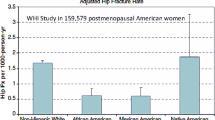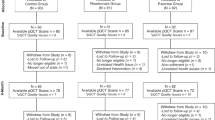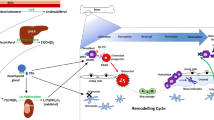Abstract.
Hormone replacement therapy (HRT) prevents bone loss in postmenopausal women. Up to 20% of women demonstrate no increase in bone mineral density (BMD) on HRT. We examined whether early changes in serum bone alkaline phosphatase (B-ALP) predict long-term BMD changes in postmenopausal women on HRT. Ninety women within 1 year of menopause were randomly assigned to continuous or sequential estrogen/progestin (beta estradiol/norethisterone acetate) if naturally postmenopausal, or beta estradiol if within 1 month of surgical menopause. Spine, femoral neck BMD (DXA), and B-ALP were determined over 2 years. The mean percent BMD changes were 3.8%, 2.9%, 1.6% in the spine and 2.4%, 4.0%, 1.1% in the femoral neck in sequential, continuous, and estrogen alone treatment groups, respectively, significantly different from zero except for femoral neck BMD change in the estrogen alone group. HRT was associated with spine and femoral neck BMD loss in 17.4% and 25.3% of women, respectively. In estrogen/progestin-treated women, baseline B-ALP correlated with spine BMD change (r = 0.42, P < 0.01). At 3 months, B-ALP dropped significantly in the estrogen/progestin-groups with a maximal decrease at 12 months, but no change from baseline in the estrogen alone group. Using quartile analysis, women with the greatest drop in B-ALP (≥50%) at 6 months demonstrated the greatest gain in spine BMD at 2 years. A 40% decrease at 6 months in B-ALP had a 56% sensitivity, 83% specificity, 95% positive predictive value for spine BMD gain at 2 years. The decrease in B-ALP can be used to monitor BMD response to HRT.
Similar content being viewed by others
Author information
Authors and Affiliations
Additional information
Received: 6 January 1999 / Accepted: 13 August 1999
Rights and permissions
About this article
Cite this article
Dresner-Pollak, R., Mayer, M. & Hochner-Celiniker, D. The Decrease in Serum Bone-Specific Alkaline Phosphatase Predicts Bone Mineral Density Response to Hormone Replacement Therapy in Early Postmenopausal Women. Calcif Tissue Int 66, 104–107 (2000). https://doi.org/10.1007/s002230010022
Issue Date:
DOI: https://doi.org/10.1007/s002230010022




